How to Compost for Zero Waste Living Without a Compost Bin
When I gave up plastic, I quickly noticed that the only thing going into my rubbish bin was food scraps. Take out the plastic, and food waste is pretty much all that’s left. Glass, paper, cardboard and metal are commonly recycled, so these would go in the recycling bin.
It’s not that I was throwing perfectly good food away. You wouldn’t catch me doing that! Food waste includes spoiled fruit and vegetables, the peels, the skins, the outer leaves, the cores, the husks, the seeds. The inedible bits.
Food waste makes up almost 40% of the average domestic rubbish bin. Without the plastic, it was nearly 100% of mine! I realised that if I could set up a system for dealing with food waste, my bin would be empty.
The thing was, when I began living zero waste, I lived in an upstairs flat without a garden. The good news is, we managed. There is always a way! There are actually plenty of ways to deal with food waste without having a garden or even a compost bin.
A Zero Waste Guide to Composting (No Garden? No Problem!)
1. Regular Composting
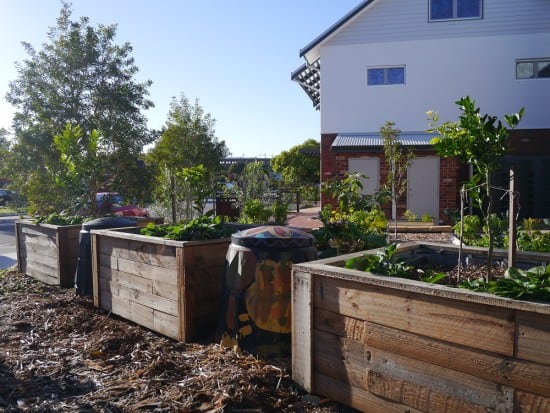
A standard compost bin requires a patch of soil or dirt about 1m² where it can be dug in. That isn’t a huge amount of space. Even if you don’t have your own garden, there might be a shared area where you can put one.
And if the reason you’re not composting is simply because you haven’t yet got yourself a compost bin yet… Well, get yourself on the local classifieds sites or Freecycle immediately! There is no time to lose ;)
Suitable for: anyone with a small patch of dirt.
Not suitable for: apartment dwellers, those with no outdoor green space.
2. A Rotary Composter
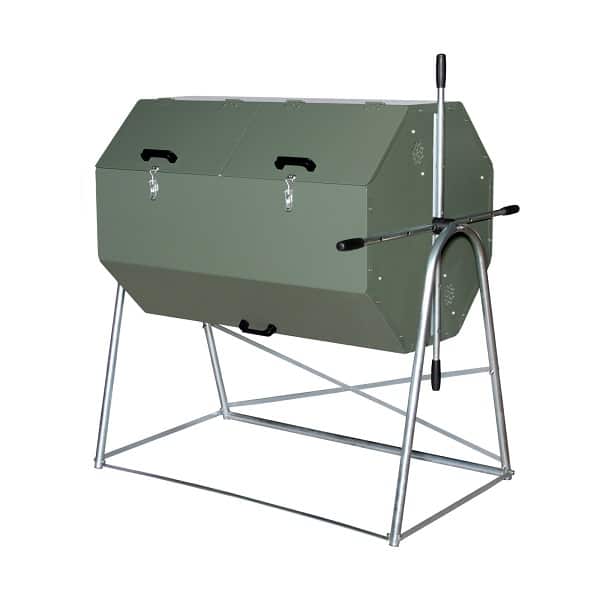
A rotary composter is a compost bin suspended on a frame, making it useful for small spaces and paved surfaces. They are also called barrel composters and spinning composters. They are often more expensive than regular compost bins, and it is worth paying extra for one that is well designed and sturdy. They can be difficult to turn when full, particularly the larger ones, so bear that in mind before choosing the XL model. Read reviews to find a model that suits your needs.
Suitable for: anyone with a balcony, yard or space outdoors.
Not suitable for: people with back or strength issues (who may find turning it hard).
3. Neighbours with Compost Bins (or a Garden)
You might not have a garden, but what about your neighbours? Would they mind if you put a compost bin on their land? How about family and friends living locally? It doesn’t hurt to ask, and it’s a great way to build good relations with your neighbours.
Alternatively, check out this great site Sharewaste.com, which lets you either find places to take your compost, or offer your compost bin to others. I’ve registered my bins!
Suitable for: anyone with friendly neighbours or friends/family with a garden.
4. Council collections
When I lived in Bristol (UK) I was lucky enough that the council would collect food scraps from my door once a week for composting. If you live in an area with this service, make use of it! If you don’t live somewhere where this happens, contact your council and find out if there are any plans to launch it in the near future.
(If your friends or family have this service but you don’t, maybe you can make use of theirs!)
Suitable for: anyone with a council composting collection service.
5. Collected Compost
This is similar to the council composting scheme, except they are run privately. Food waste is collected from your door and taken away for composting. Unlike the council services, there may be a small charge for these services.
Sometimes Farmers Markets offer this service, so you can take your compost waste to the Farmers Market.
Suitable for: anyone living in the catchment of a private compost collecting company.
Not suitable for: anyone on a tight budget who doesn’t want to commit to weekly collection fees.
6. Community Garden Composting
If you don’t have space to compost at home, and you don’t have neighbours, friends or family who are able (or willing) to help you out, community gardens are a great place to take your compost. Many are willing to take food scraps without the need for you to be a member (although being a member is a great way to support a local organisation doing good in the community). Find out where the nearest community garden is to your home or your place of work, and get in touch to find out how you can connect your waste with their bins.
Suitable for: anyone living or working near a community garden with compost bins.
7. Worm Farm (Vermicomposting)
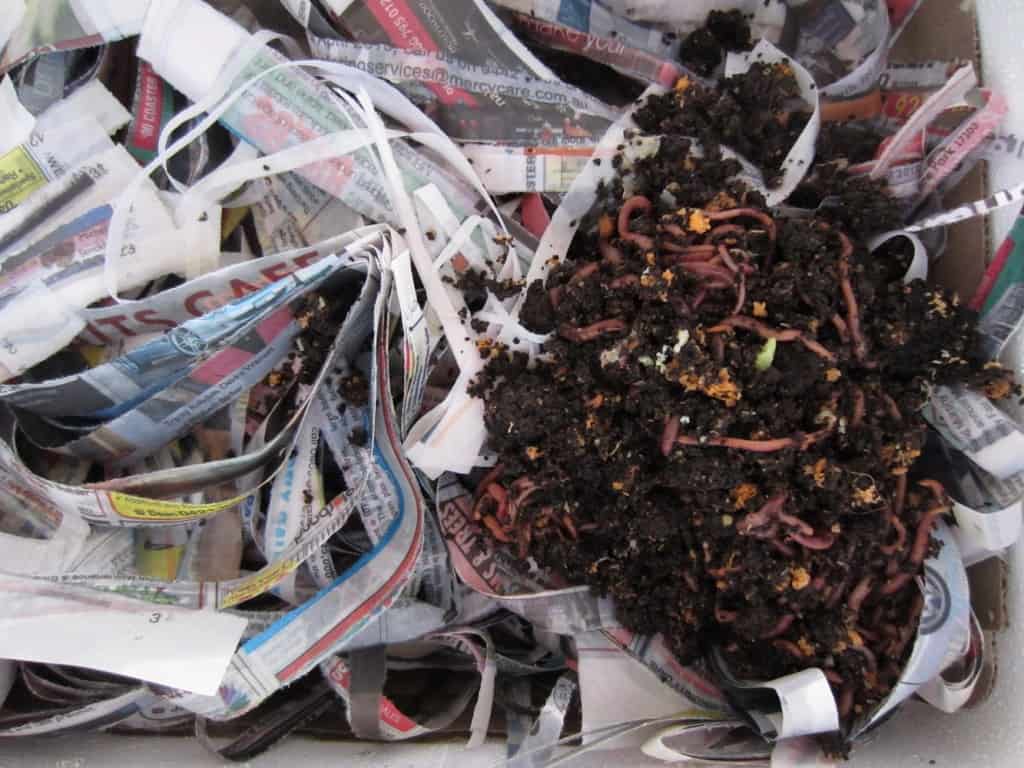
A worm farm is typically a box with air holes, drainage and a lid, and worms. Worm farms (also called vermicomposting) uses composting worms, which are fast growing and fast eating, rather than earthworms that you might dig up from your garden. They eat food waste and turn it into rich worm castings that is a great soil additive.
They are available for purchase (often in the second-hand ads) or you can make your own using waste materials.
Worm farms can be kept indoors or outdoors dependent on climate (worms don’t like the cold). If looked after properly they do not smell.
Suitable for: everyone, but especially apartment dwellers and those without a garden.
8. Bokashi
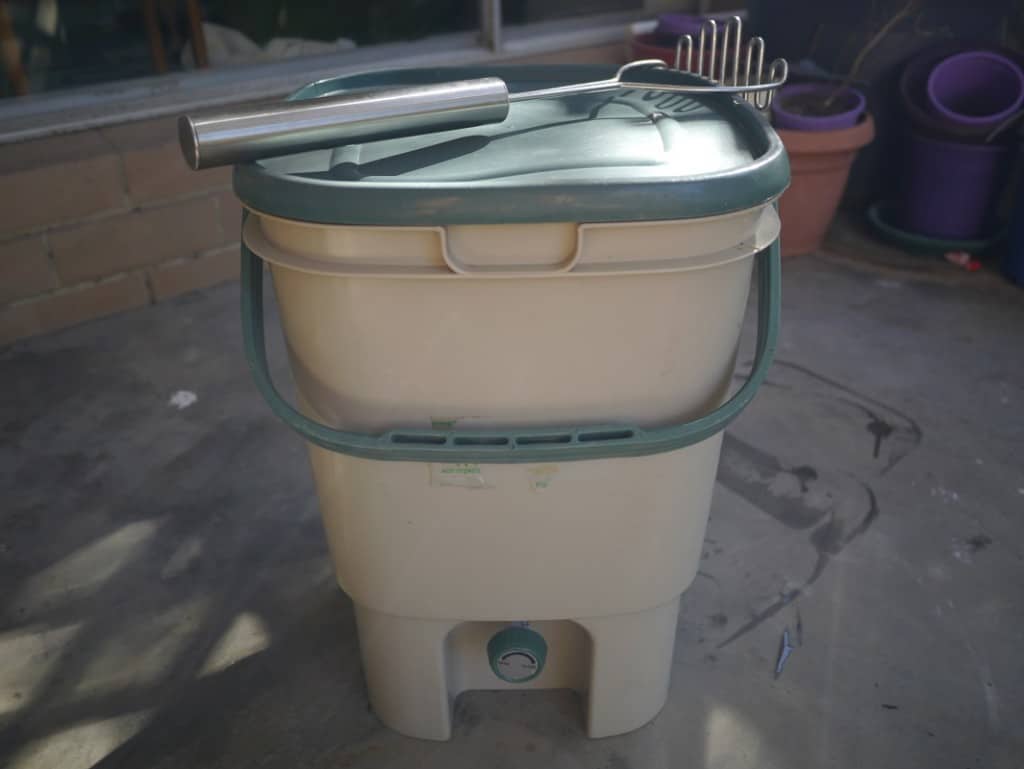
Bokashi bins ferment waste rather than breaking it down. They are an indoor home composting system and can deal with all types of waste, including cooked food and meat/fish products. Inoculated bran is added to the bin to kickstart the fermentation process. The bokashi bin is sealed and does not smell.
Once filled the contents need to be dug into a garden or added to a compost bin, so access to outside space is necessary.
Find out more about bokashi composting.
Suitable for: meat eaters who have waste unsuitable for composting.
Not suitable for: anyone without access to outdoor space.
…
When we began our zero waste lifestyle, we started out with a single worm farm. That grew to two worm farms, and we added a bokashi bin to the mix too. Now we have a garden we still have the worm farms and the bokashi bin (although this is not currently in use) and have established not one but four compost bins! This means we have space not only to compost our own food scraps, but other people’s too :)
Now I’d love to hear from you! How do you deal with your food waste? Do you compost, or have a worm farm, or a bokashi? Do you have all three?! Or none of them, and you do something completely different? Have you tried any of these and not got on with them? Do you need help or troubleshooting? Which one is your favourite? Any that you’d like to get started with? Tell me your thoughts in the comments below!
[leadpages_leadbox leadbox_id=123a865e9839c5] [/leadpages_leadbox]
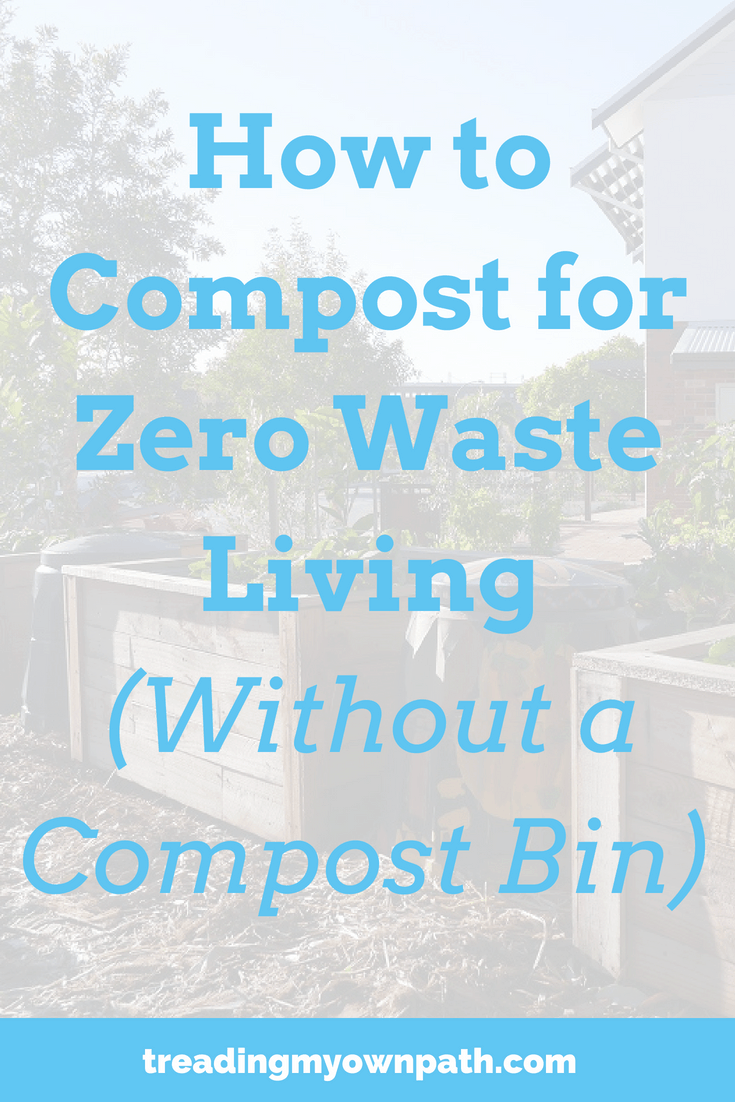






This new collection service (set up by a friend of mine) is a great option for people who want or need to outsource their composting – http://try.kooda.co
Note: their aim is to catch customers who are not motivated to compost/worm farm at home, that’s why it’s marketed more on the basis of convenience etc rather than primarily on the environmental benefits.
Thanks for sharing Deb :) Whereabouts is Kooda collecting from – I know it’s Perth but if you have specific details that would be very helpful!
I started about with a worm farm in a polystyrene box from a workshop I went in Victoria park In July 2015. I added an extra “proper” farm I got from gumtree earlier this year. I called them the went shack and the mansion :) . I love my worms! So easy to care for and so efficient! We are family of three and they care of all our scraps (except meat/fish and dairy)
I did exactly the same Irene! Whilst I hate polystyrene, I like being able to save things from landfill and I thought it was a great temporary solution whilst I decided whether I liked the method or not. And of course I did! We rescued a worm farm from the verge; the tap is broken so it is always on but we just leave a container underneath. Worms are awesome, I agree!
We actually have a fridge worm farm here now, but I’m still waiting for someone to seal it up so we can get it cranking! I think the fridge is a castle ;)
I built a compost bin from 4 old pallets. You can read about how I did it here- https://minimalistexposure.wordpress.com/2015/04/12/building-a-compost-heap/ (Design found in the book called The Complete Tightwad Gazette).
That’s great Lizz! It looks awesome :) Thank for so much for sharing.
Another great post!
Rotary tumblers are fantastic. I just turn them daily and it breaks down everything quickly. I don’t even need to tear up the middle from toilet rolls! You need two though, one for current use and the other to be left for breaking down. I got two second hand. Get the ones with just grooves for your hands to fit into to turn as the winding handles often break and they are hard to turn. I compost my bones from making bone broth in them as they are sealed. The bones break down to mush, or are helped with a hammer! The hammer gets used for bashing hard seeds like apricots or avocados into pieces also! I love my composters!
Thanks for sharing your experience Susan! Rotary composters seem so divisive: some people love them and others cannot stand them! I think they look great, and we thought about buying one when we lived in the upstairs flat, but our worm farms worked well enough.
Are you able to share the type that you have? It would be good to know the size/type in case someone else is looking :)
Mine are Ezy Roll Compost Barrow but I’m pretty sure they aren’t made anymore. I saw a bloke at the Royal Show in Perth a few years ago, who makes a single bin but with two compartments so you only need to turn one each day.
I bought a worm farm which uses a big wheelie bin for the worms home. I also have a compost bin tumbler. Citrus, onions and leafy garden greens go into the compost bin with shredded paper and dry leaves for carbon. All my paper waste goes into the compost and I also give some to the worms on occasions.
Large seeds from Avocado and fruit get processed through a mulching/wood chipping machine. Its a powerful petrol powered machine and I also process woody branches from the garden up to about 70mm.
Any cardboard is saved is laid in the garden as sheet mulch when I have enough to cover a reasonable area. The wood chips that I process go on top of the cardboard. Its a great way to suppress weeds and keep moisture in the ground. Obviously you need to remove any packing tape from the cardboard.
No garden waste leaves my home.
Thanks so much for sharing this, it sounds like quite a system that you have! Great idea to mulch the avocado stones, I am forever picking them out of the worm castings and compost.
Our neighbours have a mulcher. I don’t have one but it is something that I’ll think about once we have trees big enough to prune. The only thing that goes in our landfill bin from the garden and verge is the couch grass (which our neighbours weed out). But I did see a friend recently cook it in a solar oven, and then compost it. Maybe I will invest in a solar oven. The one plus side is that our green bin does actually go through a commercial composter.
Thanks for sharing!
Love my ‘wendy worms’ – two farms (of course)! also two compost bins; I often get scraps from my mum which helps to feed everybody !
Composting is like an addiction – I get jealous of other people’s food scraps these days! ;)
I had Bokassa for perhaps two years before abandoning it. It does smell, of a strong vinegar smell. When I’d drain it, it’d sometimes overflow the catchment jar and the smell would linger. To bury it, it needed to be driven to my parents and spilt in their car once. When I moved in with the BF we were in a suburb with many kerb side communal bins, but over the three years they disappeared until only one remained (owned by the suburbs famed off grid advocate). I’m now once again in a different location and nothing :s I’m an apartment dweller. Whilst there’s gardens and a park opposite, there’s no simple way I can see me composting and burying that or compost, I don’t really have a balcony. I don’t like how I’ve gone away from my once strong zero waste aims though
Oh Sarah, I can relate! We had a bokashi in our upstairs flat, and we kept it in the kitchen. It only smelled when we took the lid off but that smell is pungent! The liquid smell definitely lingers. I used it once to clean the sink drain and I ended up running the tap forever to try to wash it through (what a waste of water!) – I couldn’t bear the smell. Not such an issue for the toilet. And yes, lugging it down flights of stairs is a pain. I think it is a good system, but definitely for the more committed and probably not for the faint-hearted!
Another great option, if you can, is to get a few chooks. Our three not only produce beautiful eggs, but they fertilise the three fruit trees in their run (a nectarine, plum and apple) and eat dinner leftovers for their breakfast. We also give them lawn clippings, garden weeds like dandelions and spent vegetable plants.
Another thing I do is keep a bag in the freezer for onion peels (not suitable for worms or chooks), leek greens, carrot peels, chicken bones etc, and when the bag is full I make a big batch of stock.
Hi Kate, I would love to get chickens, but sadly we have nowhere to put them. Well, if I had my way we’d dig up the lawn, but I live in a strata and some of the other owners want to keep it in case a family with young kids want to move in. In my view the lawn is pretty uninspiring, we have some awesome parks just minutes away, and what kid wouldn’t love a chicken?! Maybe one day…
I’ve just completed my first year of managing all my own organic waste despite living in an apartment with no garden. I have 2 worm farms who do a great job, they were a bit slow at the start but now fly through whatever I give them including quite a bit of cardboard and my neighbour’s scraps/peel etc. I’ve even advertised on sharewaste.com as I reckon they could get through more.
I cook a lot of chicken broth though with chicken frames and that’s proven a bit trickier as I generate a lot of chicken bones, onions and also citrus peelfrom making my own fermented lemon and gingerade, none of which the worms can deal with. What I’m doing there is cycling through two Bokashi bins and two soil factories. I fill a Bokashi bin about once ever 6-7 weeks and then transfer the full one to a soil factory which is just an airtight plastic box with some old compost and lots of brown leaves and newspaper. Then at the end of 6 months I take both soil factories which at that stage have 4 Bokashi bin loads in them and which have already started to breakdown a lot and bury them into 4 deep 45cm pots on the balcony. The pots grew cucumbers, sweetcorn, spaghetti squash and carrots for me over the summer. And when I emptied out the pots to start again just a couple of weeks ago, I was thrilled to see that all the bokashi-fermented chicken bones etc that I’d buried in October had completely broken down into compost.
Thanks for sharing this Andrew, this is all very helpful! We used to live in an apartment with no garden, and managed with two worm farms and a bokashi bin (which I was able to bury in the communal garden by the parking bays). A friend told me I could put it in a big pot and grow stuff, but I never tried. I’m so glad you’ve been able to have success. I love the idea of you cycling those nutrients from food to soil and then back to food! Such a great story!
We currently have two Bokashi bins that work great (if I remember to tap it every now and then), though the smell of the liquid and the cleaning is somewhat horrid. We use it mainly to accumulate our waste and used to give it to a friend for her compost heap after fermenting. Now, when both bins are full, I cycle to my dad and empty them in the bin for curbside composting on the morning it will be emptied.
When we move from our apartment to our new family home in September, we have curbside bins for composting. Not everything can be put in though, plus I’ve heard that the compost quality of municipal compost isn’t always very good, so we will probably keep the Bokashi’s and add both a worm farm and a small patch for composting garden clippings. If I can get my husband to agree, that is, but I hope so :)
Thanks for sharing Judith! Yes I don’t love the smell of that liquid either. (And by “don’t love”, I mean it makes me want to gag.) I read it mades great drain and toilet cleaner, and I use it in the toilet, but I tried the sinks once and it wouldn’t drain away! Haunting!
Yeah municipal compost often has contaminants, so if you can make your own it will likely be better. If you plant anything at all, it makes sense to DIY your compost and soil improvers. Those food scraps are YOUR resources that you paid for – don’t give them away and then buy back compost!
I suggest people who don’t want to try composting, look at the website Share Waste for a location close to them to drop off foodscraps. Thete are lots of composters willing to take your foodwaste. In my situation I live on a 5 acre property with a husband amd 2 adult chIldren . I have 2 worm farms, 6 compost bins and 2 bokashi bins. I process foodwaste, horse manure, stable shavings and chook manure. I am also a great advocate of using compost tea across my paddocks and garden to improve the soil web. In summary I am a passionate composter!